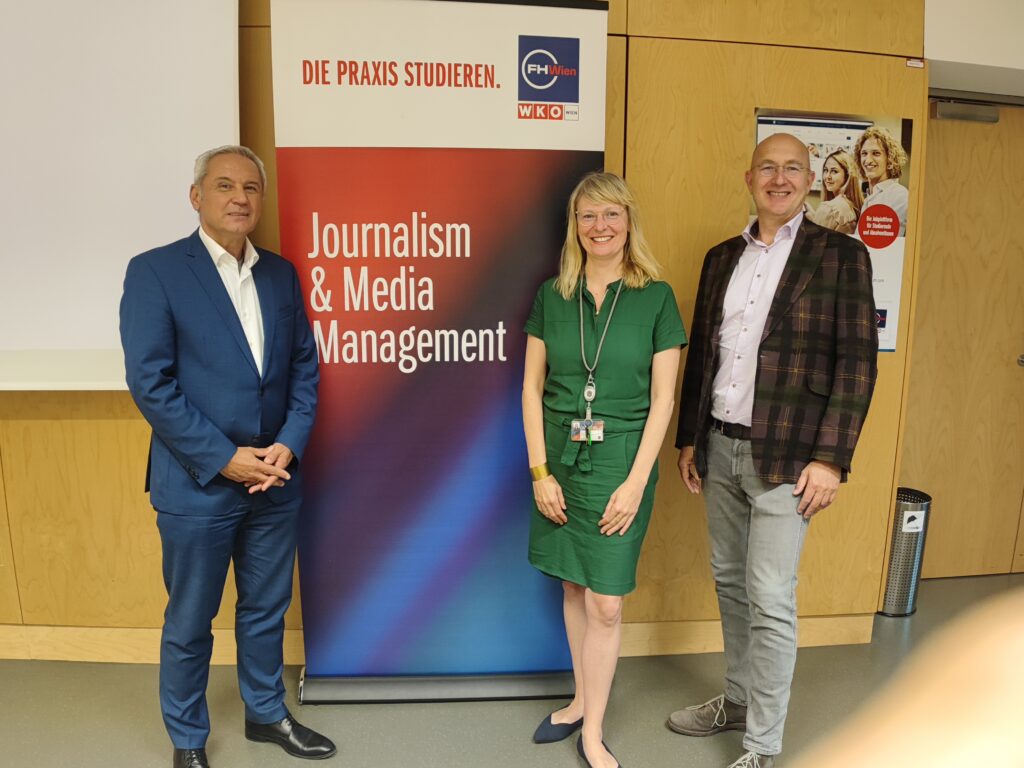Peter Fritz, long-time analyst and renowned ORF foreign correspondent, was a guest at the eleventh Public Value Lecture at the FHWien der WKW. He gave fascinating insights into the daily editorial work and the challenges of reporting in the run-up to the EU elections. The event was organized in cooperation with the ORF Public Value Competence Center.
On May 27, 2024 the eleventh Public Value Lecture took place at the FHWien der WKW, where the long-time analyst and renowned ORF foreign correspondent Peter Fritz was a guest. Under the title “(Fake) News and Opinion Machines – Challenges and Opportunities in Reporting in the Run-up to the EU Elections”, the lecture highlighted the complex challenges journalists have to face in the current media environment.
The event offered in-depth insights into the editorial processes and working methods of a foreign correspondent. Peter Fritz also explained the workings of the EU bodies and the dynamics in the European Parliament, which are particularly important in the run-up to the EU elections. The subsequent panel discussion with Konrad Mitschka, ORF Public Value Competence Center, and Gisela Reiter, Research & Teaching Associate at FHWien der WKW, focused on the increasing spread of disinformation. They also discussed strategies used by right-wing populist parties to evade journalistic scrutiny by establishing their own media offerings.
Peter Fritz emphasized the importance of fact-checking and recommended useful platforms such as the European Digital Media Observatory (EDMO) and the EUvsDisinfo website. The EDMO focuses on promoting cooperation between actors from different disciplines in the fight against fake news. It brings together fact-checkers, media literacy experts and academics to better understand and analyze disinformation. The main goal of EUvsDisinfo is also to raise public awareness of the Kremlin’s disinformation operations and to make everyone in Europe more resilient to the manipulation of digital information and media.
Public Value Report 2023/24The new Public Value Report 2023/24 was published almost simultaneously with the Public Value Lecture. It poses 50 questions to the ORF, which are intended to demonstrate the social added value of Austrian public broadcasting. What does ORF provide for 50 cents per day and household? How does it fulfill its public service mission? An article by Gisela Reiter (Research & Teaching Associate at FHWien der WKW) entitled “Trust of young users in public service news offerings” is also included. The focus is on a paradox: young Austrians use social media as their main source of news, but often do not trust the content they find there. In times of crisis, such as the Covid-19 pandemic, the consumption of traditional media has risen sharply, indicating that there is still a high level of trust in traditional media. Public service media must continue to build this trust through balanced reporting, promoting media literacy, and engaging diverse audiences through inclusive discussion forums. Read the full Public Value report here (German only); Gisela Reiter’s contribution can be found on pages 14-16. |
